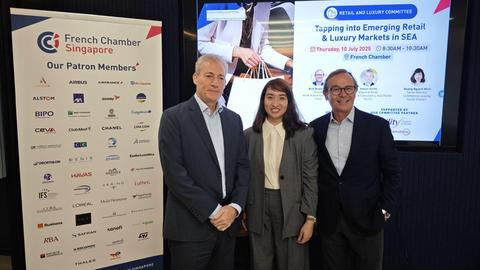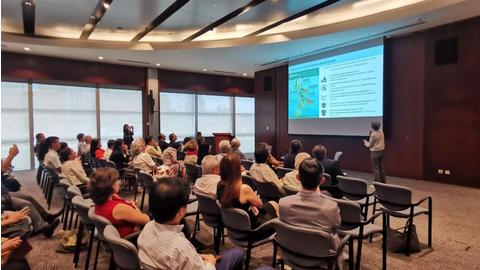Event report
Past Event | France-Singapore Circular Economy Forum

As a key initiative of the Joint Year of Sustainability France-Singapore (JYOS), the France-Singapore Circular Economy Forum, organised by the French Chamber of Commerce in Singapore with the support of the French Embassy in Singapore and the French Foreign Trade Advisors (CCE), brought together key experts from corporates, researchers, and industries to share insights, strategies, and innovations aimed at driving circularity and sustainability in business practice.
The forum started with inspiring opening remarks by Ambassador of France, Minh-di Tang, and Guest of Honor Mr. Wong Kang Jet, CEO of the National Environment Agency (NEA).
Two impactful panel discussions followed:
With leading representatives from the manufacturing sector:
- Mrs. Karine Alquier-Caro - Area VP Southeast Asia, Legrand Group
- Mrs. Valerie Patuel - CEO Safran Singapore & ASEAN Regional Delegate, Managing Director Safran Helicopter Engines Asia
- Mr. Fabrice Espinosa - Senior Advisor, CARBIOS
- Mr. Jean-Christophe P. Gabriel - Co-Director CEA/NTU SCARCE Laboratory & Research Director, Nanoscience at CEA
- Moderated by Mr. Samuel Chauffaille, Managing Director Asia Pacific (excl. China), ECOCERT Group
And leading experts from the Consumer Goods sector:
- Mr. Stephan Veyret - CEO, Decathlon Singapore
- Ms. Rameet Kaur - Brand General Manager and Head of Sustainability, L'Oréal Luxe SAPMENA
- Prof. Chueh Loo Poh - Associate Professor of Engineering Biology Research, National University of Singapore
- Ms. Florence Inumaru - South East Asia Brand Director, Boucheron
- Moderated by Mr. Grégoire Virat, Managing Partner, Middle East Asia, EUROGROUP CONSULTING
Great panel discussions which included engaging Q&A, insightful discussions, and ideas, which continued during the networking session.
Key takeaways:
- Leadership buy-in is crucial: A strong commitment from leadership is essential for driving change within a company. This commitment should be translated into measurable goals and a clear roadmap for achieving them.
- Eco-Design priorities & desirability:
- Durability: theimportance of creating long-lasting products to reduce waste.
- Reparability: Need for designing products that can be easily repaired to extend their lifecycle.
- End of Life Management: Define strategies for efficient recycling and repurposing of materials at the end of a product's life.
- Material Selection: Significance of using sustainable and recycled materials in manufacturing, and retail.
- Modularity: Advocate for designs that allow for easy upgrades and replacements of parts.
- Sourcing Recycled Materials: Identify challenges in sourcing sufficient recycled materials and the need for improved supply chains to support this effort.
- Desirability: Challenge of delivering products that are both sustainable and affordable
- Innovative partnerships:
- Non-traditional partnerships: Shared success stories of collaborations with partners outside the traditional ecosystem, such as tech startups or NGOs.
- Advice for finding partnerships: Encouraged exploring diverse networks and being open to unconventional partnerships that can drive innovation.
- Changing Business Models and Customer Requirements:
- Leasing vs. Purchase: Discussed the shift from ownership to access models, such as leasing, which promotes sustainable usage.
- Usage-Based Models: Highlighted the growing trend of customers preferring to buy services or usage rather than products.
- Cultural challenges: Addressed the cultural barriers in adopting circular economy practices and the need for mindset shifts among consumers and businesses.
- Training: Equipping employees with the knowledge and skills needed to implement circularity initiatives is crucial. This includes training retail staff on how to communicate the benefits of sustainable products to customers.
- Regulatory Incentives and government role:
- Incentives for adoption: Suggested that regulations and government policies can play a crucial role in accelerating the transition to circular economies.
- Punitive measures: Discussed the potential for penalties to enforce compliance and encourage faster adoption of sustainable practices.
The forum underscored the importance of eco-design in promoting circular economy, the need for innovative partnerships, evolving business models, and the critical role of regulations. It also highlighted the importance of corporate responsibility and consumer awareness in driving internal change and making eco-friendly products desirable.
Thank you to all our speakers and attendees for your active participation and engagement. Get ready for more events and discussions to come!







































